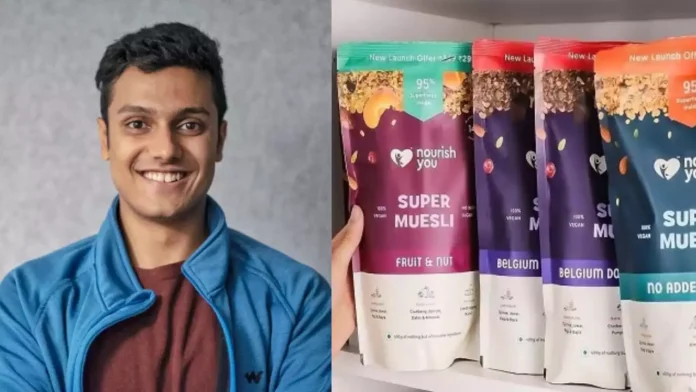Ever since the pandemic, the Indian food businesses have evolved. Meanwhile, the consumers’ quest for healthier alternatives has become more than just a passing trend. It’s obvious that the food market is experiencing a seismic shift towards cleaner, nutrient-dense products. But amidst this transformation, the question looms large: Does health as a category have a future in the Indian food market?
Abhay Rangan, Co-Founder of Nourish You, believes that health as a category holds significant promise in the Indian market. Despite recent fluctuations in consumer behavior, Rangan argues that the demand for healthy, nutritious products is here to stay.
“Personally, I think the demand for healthier, cleaner products that are also tasty is a long-term trend. When given the choice between two equally good-tasting products at the same price, people will generally choose the healthier option,” he says.
According to him, the trend of consuming healthy, nutritious products that taste good is not just a trend in India but is growing globally. This fundamental truth about consumer preferences is likely to continue shaping the market.
Rangan’s journey into the health food sector began with One Good, a company he founded that focused on plant-based dairy products. Afterwards, One Good got acquired by Nourish You, where Rangan now serves as a co-founder, bringing his expertise in plant-based products to the company’s already extensive portfolio, which includes superfoods and plant-based milk.
Continue Exploring: Nourish You acquires One Good in India’s largest ever plant-based foods merger
Size and Scope of the Health Food Market
Discussing the health food market, Rangan envisions a vast potential for the sector in India, estimating it as a $30 billion opportunity. Nourish You’s strategy focuses on delivering “clean label, nutrient-dense products” through an omni-channel approach that ensures sustainability both for the business and the environment.

However, with increasing competition in the health food sector, operational excellence is crucial. Rangan emphasizes, “Startups don’t die by murder; they die by suicide more often than by their competitor scaling them.”
This highlights the importance of a sustainable business model over aggressive discounting strategies. Nourish You’s backward integration and processing capabilities give it a competitive edge, enabling it to maintain quality and profitability.
Target beyond 1%
When questioned about Nourish You’s target audience, Rangan dispels the notion of exclusively catering to the top 1%. Instead, he underscores the brand’s commitment to accessibility, with a significant portion of sales originating from Tier 2 and Tier 3 markets.
Rangan also acknowledges the challenge of shifting preferences. “We aim to coexist with existing habits, reducing friction in adopting healthier options,” he says. “Operational excellence and accessible pricing are key.”
Role of Omnichannel Strategies
To stay in the competition, Rangan advocates for an omnichannel strategy to reach consumers effectively. “Product sampling and placement are very important. What you see is what you buy,” he explains. According to him, maintaining a significant presence across multiple touchpoints is crucial.
“At an organizational level, if your ratios are decent, then you’re doing well. Some channels will excel in certain areas while underperforming in others. For example, our D2C has a considerable presence,” he says.
While direct-to-consumer (D2C) channels are essential, especially for subscription models, they are part of a larger marketing strategy that includes significant offline presence.
Subscription Model Potential
Rangan acknowledges the potential of subscription models, particularly in India, where traditional subscription businesses like milk delivery already exist. As the health food market evolves, Rangan sees subscriptions as a natural fit for habit-forming products.
“Habit-forming and coexisting with existing habits very naturally lends to a subscription model,” he says, suggesting that this approach could enhance customer retention and satisfaction.
Millet Challenge
A big part of Nourish You’s business revolves around seeds like quinoa, chia, watermelon seeds, pumpkin seeds, and more. Additionally, they offer value-added products such as millet noodles and other millet-based items. However, Rangan feels it’s a tricky market, as there are already too many players with millets products, but the brand approaches it with renewed confidence, he says. “It boils down to product market fit.”
These categories are attracting interest from several players, especially considering the export potential they’ve built for India. However, the challenge is to ensure that millet products meet consumer expectations in taste, price, and convenience. Despite the difficulties, Rangan remains optimistic, believing that successful product development will drive market acceptance.
Currently, Nourish You engages in contract farming, cultivating quinoa over approximately 5,000 acres. Additionally, it claims to have pioneered the establishment of the first quinoa processing facility in India.
Looking Ahead: The Next Six Months
For the immediate future, Nourish You aims to focus on operational excellence and expanding its footprint. “Increasing our footprint, making sure that we have the operational excellence to convert the raw materials and then get them to the right point of sale is very important,” Rangan explains. This strategy underscores the importance of logistics and process optimization in meeting existing demand efficiently.
Looking ahead, Rangan remains grounded yet optimistic. “The basics matter – operational efficiency, distribution optimization, and staying true to our mission,” he muses. “The demand is there; now it’s about meeting it with excellence.”





